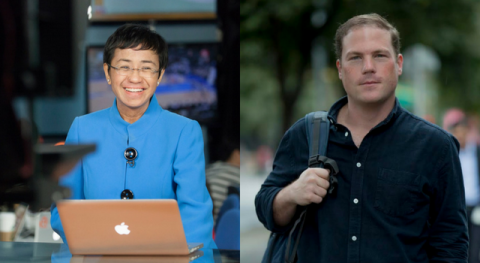
Two digital pioneers who have used their news websites to expose corruption and abuse of power in the Philippines and Venezuela have been tapped for the 2018 Knight International Journalism Awards, the International Center for Journalists (ICFJ) announced.
The recipients are Maria Ressa, an intrepid editor and media innovator who holds a spotlight to the Philippine government’s bloody war on drugs, and Joseph Poliszuk, who reports on high-level corruption in the midst of Venezuela’s economic collapse. Both have withstood harsh threats and lawsuits that could force them out of business.
The Knight International Journalism Award, which recognizes excellent journalism that has made an impact, is supported by the John S. and James L. Knight Foundation, which funds the ICFJ Knight Fellowships. The fellowships promote a global culture of news innovation.
“For the first time, both Knight Awards are going to the founders of digital news sites who fearlessly pursue the truth,” said ICFJ President Joyce Barnathan. “In the face of severe government crackdowns, they boldly persist in telling the stories that need to be told.”
“These reporters reinforce the principles of truth-seeking, accuracy and fearlessness, rooted in the core values of journalism, while revealing the power of digital storytelling to hold leaders to account and extend the reach of hard-to-get news, far and wide,” said Jennifer Preston, Knight Foundation vice president for journalism.
Ressa, a longtime CNN correspondent who founded the popular website Rappler in 2012, is at the forefront of investigative reporting in the Philippines. Her news site was an early platform for media innovation: Rappler was among the first in the country to use social media and crowdsourcing for news distribution.
Rappler has persistently shed light on the harsh policies of President Rodrigo Duterte. Rappler reported that under Duterte nearly 8,000 Filipinos have been victims of extrajudicial killings. In response to the reports, Duterte and his government have targeted Rappler, making it a major focus of its attack on press freedom. Ressa is now fighting the government’s move to revoke Rappler’s license and thus silence it on grounds that the site is owned by foreigners, a charge Ressa calls ridiculous.
Joseph Poliszuk is co-founder and editor-in-chief of Armando.info, a website dedicated to investigative journalism in Venezuela, a country teetering on the verge of bankruptcy and political collapse. Transparency International has been ranked it as one of the 10 most corrupt in the world.
Poliszuk leads a team of reporters who have produced major investigations revealing financial misdeeds and corruption. He also coordinated Venezuela’s participation in the Panama Papers project, the ground-breaking investigative journalism project that revealed the hidden wealth of global elites. Their reporting led to the arrests of at least a half dozen influential Venezuelans.
Poliszuk and three colleagues were forced to flee Venezuela this year after a criminal lawsuit was filed by a powerful businessman they exposed. The charges carry a sentence of up to six years imprisonment for each of the journalists, who also have been targets of ugly and personal social media attacks.
The two Knight Award winners will be honored on November 8, 2018 at the ICFJ Awards Dinner in Washington, D.C.
To learn more about the Awards Dinner or to purchase a ticket, please visit our dinner page, or contact ICFJ Development Associate Andria Moore at amoore@icfj.org.